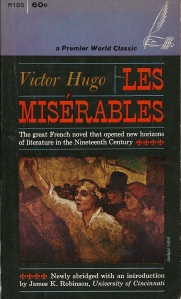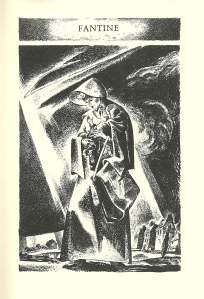BLOG #39, SERIES 4
WEDNESDAYS WITH DR. JOE
DR. JOE’S BOOK OF THE MONTH CLUB #23
VICTOR HUGO’S LES MISERABLES
September 25, 2013
Last month, I let you relax, walk the beach, and regenerate your batteries. But now autumn is here, school is in session, and it’s time to lower the boom on you! It’s time for one of the world’s greatest heavyweights. Heavyweights indeed: depending on a number of variables, an unabridged copy comes to somewhere between 1400 and 2000 pages.
But remember this: Don’t ever waste your time reading an abridged copy of any book worth reading! I always wonder when I look at an abridged book, How can any human being have the gall to conclude that s/he knows more about what is important in a book than the person who wrote it?
So I expect you to read every word in the unabridged version. But I am not a Simon Legree: Because I want you to take the time to really savor the book, I am permitting you to take two months to complete it. There won’t be another Book of the Month until December. First of all, purchase an unabridged you can mark up, reason being Les Miserables is one of the most quotable books ever written. An additional word of warning: In recent years more and more publishers have committed what I call a crime: publishing abridged versions of classic books without indicating inside the book that it is incomplete. So, do your homework in this respect.
* * *
Victor Marie Hugo (1802-1885), French poet, novelist, dramatist, and leader of the Romantic Movement in France, lived life on the grand scale. Since his father was a Bonaparte general, Hugo’s early years were lived in luxury; but then came the fall of the Napoleonic Empire, and life got much harder. Suffice it to say that he is generally considered to be one of the towering figures in world literature.
Since it would take years to fully digest all that Hugo accomplished, I won’t even try, leaving such a fascinating journey to you. Most of the growth in my own life has resulted from just such side trips of discovery as I am suggesting to you now.
If you only tackle a few of Hugo’s books, I suggest you seriously consider The Hunchback of Notre Dame and Toilers of the Sea.
Hugo spent fourteen years laboring on this monstrous book. I don’t want to deprive you of the pleasure of discovering the novel on your own, so I certainly won’t spoil your reading pleasure by giving away the plot of what is almost universally considered to be one of the greatest novels ever written. I might even go out on a limb by admitting I have yet to read a more powerful or deeply moving book than this. When I completed it for the first time, I wrote down this summation: I am numb. It is a book to go back to again and again, for it is inexhaustible and it is suspenseful—a great read!
I think the best summation of its power was penned by the English scholar and critic, Algernon Charles Swinburne:
Les Miserables is the greatest epic and dramatic work of fiction ever created or conceived. The epic of a soul transfigured and redeemed, purified by heroism and glorified through suffering; the tragedy and comedy of life at its darkest and its brightest, of humanity at its best and at its worst.
Vincent Hopper and Bernard Grabanier, in their two-volume Guide to World Literature (Barron’s Educational Series, 1952), declared that Les Miserables “is one of the most moving appeals ever made in the history of literature to our common humanity; only a great soul could have written it.” They also point out that it is more a collection of novels than just a novel.
Don’t be tempted to lose interest when Hugo appears to have forgotten what he was writing about, and wanders off in what will seem to be a totally irrelevant direction. Those side trips will all prove their relevance later on; and if you failed to carefully read them, I guarantee you will end up failing to internally capture the power of the novel! Indeed, those side-trips have developed world-wide fame on their own—especially the passages depicting the Battle of Waterloo, the sewers of Paris, the flight of Jean Valjean, the portrait of the Bishop, the drama of the candlesticks, and the description of the Benedictine monastery. Indeed, the book might aptly be likened to a vast mosaic or puzzle: as you read along you will keep slotting in images, many seeming not to fit in anywhere, but by the moving conclusions, all the pieces will finally be placed—and you’re left with the completed masterpiece. Interestingly enough, John Steinbeck, much later on, borrowed from Hugo in his own sidetrips in The Grapes of Wrath.
Welcome to one of the world’s greatest books. I look forward to hearing back from you after you return from Victor Hugo’s world, from experiencing first-hand the French Revolution.


Leave a comment